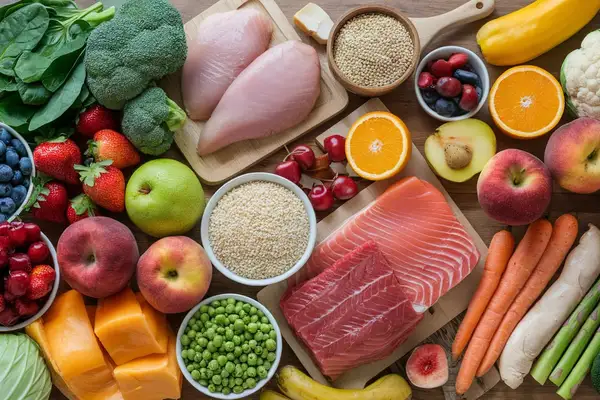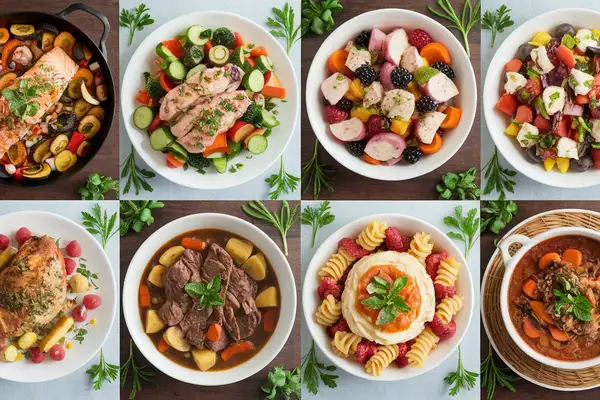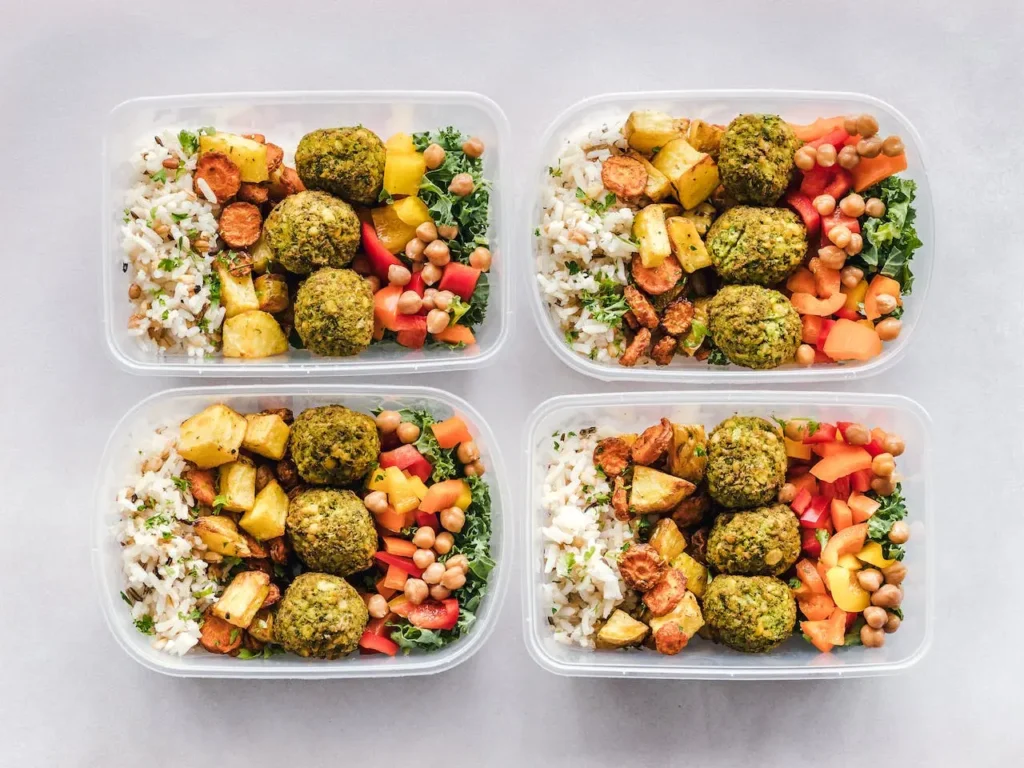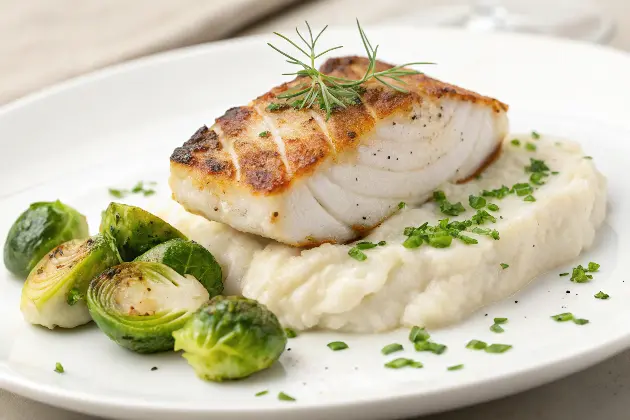Healthy 7-Day Animal Based Diet Meal Plan For Beginners
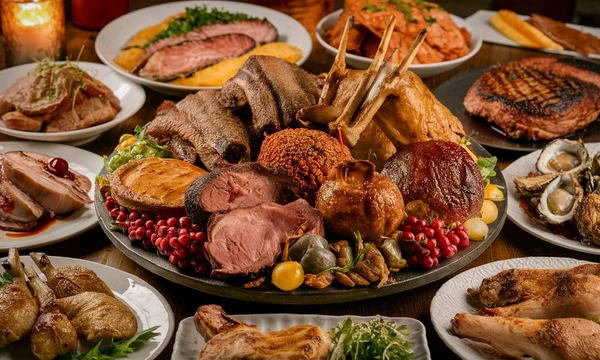
This post may contain affiliate links, meaning I may earn a commission if you make a purchase, at no extra cost to you. I only recommend products I trust. Thank you for your support.
Embarking on a nutritional journey can be a transformative yet daunting endeavor, especially when sifting through the plethora of diet plans available.
Among them, the animal based diet has surged in popularity due to its straightforward approach to eating and the myriad of health benefits it offers.
This animal-based diet emphasizes foods that are directly derived from animal sources, marrying simplicity with nutritional density.
As you explore this eating style, understanding the foundational aspects of what constitutes an animal-based meal and how to effectively integrate it into your daily life is paramount.
Our free 7-day animal based diet meal plan is designed to kickstart your journey, showcasing the variety and richness of meals you can enjoy while adhering to this dietary philosophy.
Additionally, we’ll provide you with an animal based diet food list of resources to further support your dietary transition.
By the conclusion of this article, you’ll be well-equipped with the knowledge and tools needed to embrace an animal-based diet confidently.
What is the Animal Based Diet?
The Animal-Based Diet is a nutritional approach that emphasizes the consumption of animal products while allowing for a limited selection of plant-based foods.
This diet aims to maximize nutrient density and minimize the intake of anti-nutrients commonly found in many plant foods.
Origin of the Animal Based Diet
The concept of an animal-based diet isn’t new. Historical evidence suggests that early human diets were predominantly meat-based.
Notable figures like the German writer Bernard Moncriff in 1856 and Italian physician Arnaldo Cantani in the 1870s promoted exclusive meat diets for health benefits.
In more recent times, the carnivore diet gained popularity through advocates like Shawn Baker and public figures like Jordan Peterson, emphasizing a diet consisting solely of animal products like meat, eggs, and dairy.
Core Principles of the Animal Based Diet
- Focus on Ruminant Animals: Meat from grass-fed ruminant animals like cattle, buffalo, goat, lamb, and deer are preferred.
- High Protein Intake: Emphasis on high-quality, complete proteins that are rich in essential amino acids.
- Organ Meats: Incorporate organ meats (liver, heart, kidney, thymus, tongue, testicle, and bone marrow) to obtain essential nutrients not found in muscle meat or plant foods.
- Low to No Carbohydrates: Minimizing or eliminating carbohydrate intake from plant sources. Avoidance of grains, legumes, fruits, and vegetables.
- Whole, Unprocessed Foods: Eating foods in their most natural, unprocessed state such as fresh cuts of meat, whole fish, eggs, and raw dairy products.
Examples of Animal Based Diets
- Carnivorous Diet: The carnivore diet consists almost exclusively of meat and animal products. It excludes plant-based foods entirely.
- Paleo Diet: The Paleo diet is based on the types of foods presumed to have been eaten by early humans.
- Atkins Diet: The Atkins diet is a low-carbohydrate diet that emphasizes protein and fat consumption.
- Zero Carb Diet: Similar to the carnivorous diet, this diet excludes all carbohydrates, not just those from plant sources.
- Lion Diet: The Lion Diet is an extreme elimination diet that involves eating only meat from ruminant animals (e.g., cows, deer, sheep, goats), salt, and water.
Animal Based Diet Food List
Here’s a comprehensive list of foods typically included in an animal-based diet:
Ruminant Meat:
- Beef (steak, ground beef, roast)
- Bison
- Lamb
- Goat
- Venison (deer)
Pork:
- Pork chops
- Bacon
- Pork belly
Poultry:
- Chicken (breast, thighs, wings)
- Turkey
- Duck
Organ Meats:
- Liver
- Heart
- Kidney
- Thymus (sweetbreads)
- Tongue
- Testicles
- Bone marrow
- Gizzards
Seafood / Fish:
- Salmon
- Sardines
- Mackerel
- Cod
- Tuna
- Trout
Shellfish:
- Shrimp
- Lobster
- Crab
- Oysters
- Mussels
- Clams
Eggs:
- Chicken Eggs
- Duck Eggs
- Quail Eggs
Dairy:
- Raw Milk (preferably from A2 casein-producing animals like goats and sheep)
- Cheese (raw, unpasteurized)
- Yogurt (full-fat, unsweetened)
- Butter
- Ghee
- Cream
- Kefir
Animal Fats:
- Tallow (beef fat)
- Lard (pork fat)
Low-Toxicity Plant Foods:
- Strawberries
- Blueberries
- Raspberries
- Blackberries
- Bananas
- Mangoes
- Pineapples
- Papayas
- Oranges
- Lemons
- Limes
- Grapefruits
- Apples
- Pears
- Melons (watermelon, cantaloupe, honeydew)
- Grapes
- Kiwi
Natural Sweeteners:
- Raw Honey
- Maple Syrup (in moderation)
Beverages:
- Water
- Bone Broth
- Herbal Teas (without additives)
- Coffee (preferably without additives, in moderation)
Foods to Avoid on the Animal Based Diet
Here is a detailed list of foods to avoid on the animal-based diet:
Vegetable Oils:
- Canola oil
- Sunflower oil
- Soybean oil
- Safflower oil
- Corn oil
Grains and Legumes:
- Wheat
- Rice
- Oats
- Beans
- Lentils
- Peanuts
Processed Snacks and Sweets:
- Chips
- Candy
- Baked goods
Vegetables:
- Spinach
- Kale
- Broccoli
- Cauliflower
- Tomatoes
- Potatoes
- Eggplants
Nuts and Seeds:
- Almonds
- Walnuts
- Sunflower seeds
- Chia seeds
- Flaxseeds
Soy Products:
- Tofu
- Soy milk
- Edamame
7-Day Animal Based Diet Meal Plan (Animal Based Recipes)
When following a 7-day animal-based diet, it’s essential to focus on high-quality animal products such as meat, fish, and eggs while excluding plant-based foods.
This 7-day animal-based diet plan includes high-protein animal based diet recipes and aims to help individuals explore the benefits of an animal based diet.
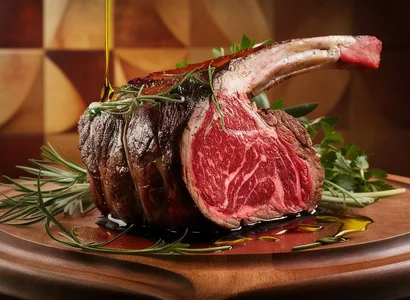
Day 1
Breakfast
- Scrambled eggs with cheese (3 large eggs, 2 oz cheddar cheese)
- Bacon (4 slices)
- Coffee with heavy cream (8 oz coffee, 2 tbsp heavy cream)
Lunch
- Grilled salmon (6 oz)
- Shrimp scampi with butter (4 oz)
Dinner
- Ribeye steak (8 oz)
- Roasted bone marrow (2 bones)
Snacks
- Hard-boiled eggs (2 large eggs)
- Cheese cubes (2 oz)
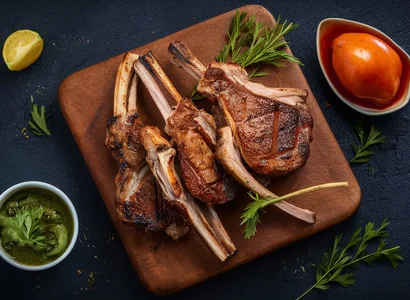
Day 2
Breakfast
- Omelette with goat cheese (3 large eggs, 2 oz goat cheese)
- Sausage links (3 links)
Lunch
- Grilled chicken thighs (6 oz)
- Shrimp cocktail (6 large shrimp, 2 tbsp cocktail sauce)
Dinner
- Grilled lamb chops (8 oz lamb chops)
- Beef short ribs (8 oz, slow-cooked)
Snacks
- Deviled eggs (2 large eggs, 1 tbsp mayo, mustard)
- Beef jerky (2 oz)
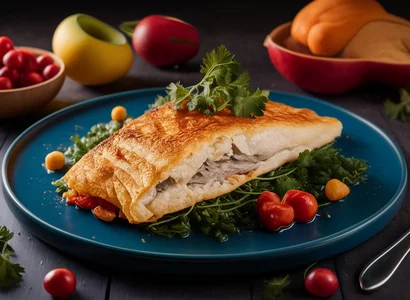
Day 3
Breakfast
- Bacon and egg cups (3 large eggs, 3 slices bacon, baked)
- Pork belly strips (2 oz)
Lunch
- Grilled mackerel (6 oz)
- Roast turkey slices (6 oz)
Dinner
- Duck confit (8 oz)
- Baked haddock (6 oz, with lemon butter)
- Rabbit Stew (1 lb rabbit meat, cut into pieces)
Snacks
- Prosciutto slices (4 oz)
- Cheese cubes (2 oz)
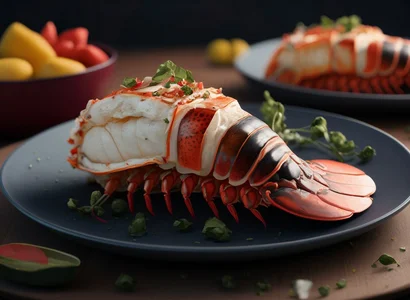
Day 4
Breakfast
- Chicken liver and scrambled eggs with cream cheese (3 large eggs, 2 oz cream cheese)
- Wild Salmon and crab burger (6 oz wild salmon fillet, 4 oz crab meat)
Lunch
- Grilled shrimp skewers (6 large shrimp)
- Chicken drumsticks (6 oz, roasted)
- Guacamole (1/2 cup)
Dinner
- Veal cutlets (8 oz, pan-fried)
- Lobster tail (6 oz, with garlic butter)
Snacks
- Raspberries (1/2 cup)
- Smoked oysters (2 oz)
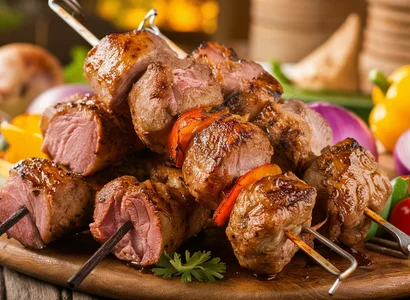
Day 5
Breakfast
- Ribeye steak and fried eggs (3 large eggs, cooked in 1 tbsp butter)
- Canadian bacon (4 slices)
Lunch
- Salmon fillet with butter sauce and shrimp (6 oz)
- Grilled lamb kebabs (6 oz)
Dinner
- Prime rib (8 oz, roasted)
- Baked sea bass (6 oz, with herb butter)
Snacks
- Duck liver mousse (4 oz)
- Crackers made from cheese (2 oz)

Day 6
Breakfast
- Kangaroo steak and eggs (4 oz steak and 3 large eggs)
Lunch
- Grilled tilapia (6 oz)
- Turkey legs with skin (6 oz)
- Roast beef slices (6 oz)
Dinner
- Duck breast with cherry sauce (8 oz duck breast, 1 cup pitted cherries)
- Baked haddock (6 oz, with lemon butter)
- Oxtail stew (1 lb oxtail, 4 cups bone broth)
Snacks
- Pemmican (1 lb dried meat)
- Marinated anchovies (6 oz anchovies, 1/2 cup olive oil)
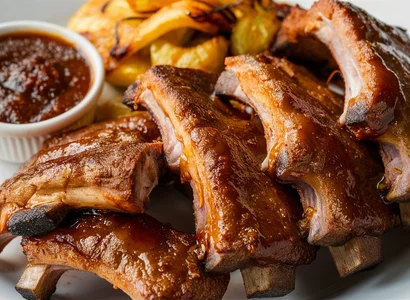
Day 7
Breakfast
- Elk sausage and eggs (2 large eggs)
- 1 cup bone broth (2 lbs beef bones or chicken carcasses)
Lunch
- Pan-seared trout (6 oz)
- Boar ribs (8 oz)
Dinner
- Ground chicken mixed with cotija cheese (1 lb ground chicken)
- Braised goat shank (1 lb goat shank, 4 cups bone broth)
Snacks
- Duck liver pâté (8 oz duck liver, cleaned and trimmed, 1 small shallot)
- Hard cheese cubes (2 oz)
Benefits of an Animal-Based Diet
An animal-based diet offers numerous health benefits, including:
- Nutrient Density: Animal-based foods such as meat, organs, eggs, and raw dairy products are rich in B vitamins, proteins, essential Omega-3 fatty acids, and other vital nutrients.
- Nourishment: Organ meats contain higher concentrations of vitamins and minerals, contributing to overall nourishment.
- Improved Health: Consumption of animal-based foods can lead to weight loss, improved blood pressure, insulin sensitivity, and overall health and wellbeing.
- Balanced Energy: Many individuals report increased energy and improved mood when following an animal-based diet.
- Satiety and Weight Management: Animal based foods are satiating, aiding in weight management and improved body composition.
- Quality Sleep: Some individuals on an animal-based diet experience higher quality sleep and improved gastrointestinal issues.
- Autoimmune Conditions: This diet may lead to the elimination or improvement of autoimmune conditions.
- Simplicity and Sustainability: An animal-based diet is satiating, keeps the body functioning at a high level, and is sustainable in the long term.
Potential Risks of an Animal-Based Diet
- Lack of Micronutrients: Animal-based diets may lack certain micronutrients and beneficial plant compounds found in fruits, vegetables, legumes, and whole grains.
- Heart Health: A diet consisting solely of animal foods can be high in saturated fat and cholesterol, which may increase the risk of heart disease
- Kidney Health: High protein intake can put a strain on the kidneys, especially in those with pre-existing conditions.
- Fiber Deficiency: This diet contains no fiber, which can lead to constipation and may harm gut health.
Conclusion
Embracing a diet focused on high-quality animal products not only aligns with our ancestors’ dietary patterns but also offers profound health benefits, including weight management, reduced inflammation, and improved digestive health.
This approach, while straightforward, underscores the importance of quality and variety in our dietary choices.
An animal-based diet can offer numerous health benefits, including improved nutrient intake and muscle health, but it also poses potential risks such as nutrient deficiencies and heart health concerns.
It is important to consider these factors and possibly consult with a healthcare professional before adopting this diet.
- 7-day diet plan for weight loss
- Ozempic diet meal plan
- GOLO 7-day meal plan
- 7-day vegetarian meal plan
- Vegan diet meal plan
- 7-day diet plan for acid reflux
- Foods to eat with a UTI
- 7-day low-sodium diet meal plan
- Gastric bypass surgery diet
- Blue Zone meal plan
- Hashimoto’s diet meal plan
- 1200 calorie deficit meal plan
FAQs
What foods are permitted in an animal-based diet?
An animal-based diet includes meats, fish, dairy, and eggs, excluding plant-based foods like fruits, vegetables, grains, and legumes.
Are bananas allowed on an animal-based diet?
Yes, bananas and other fruits such as avocados, apples, peaches, and papayas can be included in an animal-based diet. These fruits are low in toxicity and provide essential vitamins and minerals that complement the nutritional profile of the animal based diet.
How many eggs are recommended per day on an animal based diet?
Typically, individuals on an animal based diet consume between 2 to 6 eggs daily. This amount helps to maintain a balanced intake of nutrients.
Is an animal-based diet healthy?
An animal-based diet can be healthy due to its high protein and nutrient content, but it may also pose risks like nutrient deficiencies and increased cholesterol levels.
Can I lose weight on an animal-based diet?
Yes, the high protein content can promote satiety, which may help in weight loss.
Resources
- Animal-based diet vs carnivore diet
- Impact of an animal-based diet on cardiovascular disease
- Animal-based diet benefits for athletes
- Animal-based diets nutritional facts
Disclaimer: This article is for educational purposes only. Before making any significant changes to your diet, including adopting an animal-based diet, it is important to consult with a qualified healthcare professional or nutritionist.
